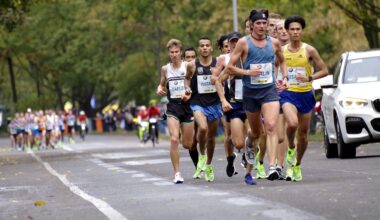Physical Activity as a Preventative Measure Against Dementia
Engaging in regular physical activity is crucial for maintaining cognitive health as people age. Various studies suggest that there is a significant link between exercise and a reduced risk of developing dementia. This connection is likely due to the positive effects of exercise on cardiovascular health, which in turn enhances blood flow to the brain. Improved circulation helps to nourish brain cells, promoting better cognitive functioning. Additionally, physical activity is known to stimulate the production of neurotrophic factors, which support neuron growth and survival. Regular exercise can help in neurogenesis, which implies the brain’s ability to form new neurons. It also aids in reducing inflammation and oxidative stress, both of which can contribute to cognitive decline. Social engagement, often associated with group exercises or physical classes, also enhances mental well-being and memory functions. Thus, incorporating physical activity into daily routines isn’t just about maintaining physical health; it’s a holistic approach that feeds into mental wellness, reducing the potential risk of dementia and other cognitive disorders in seniors. The community aspect of group exercise can also foster connections, which is vital for emotional stability.
A variety of exercises can be particularly effective in promoting brain health among seniors. Aerobic exercises, such as walking, swimming, or cycling, are beneficial for improving cardiovascular health. These activities boost heart rate, which can lead to better oxygen and nutrient delivery to the brain. Resistance training should also be incorporated, as it enhances muscle strength and mass, providing overall body support for seniors. Flexibility exercises, like yoga or tai chi, not only improve physical balance and coordination but also encourage mindfulness and mental relaxation. These practices are essential in fostering a connection between the mind and body, promoting overall health. Engaging in a mix of these activities allows seniors to enjoy a well-rounded fitness routine tailored to their abilities. Furthermore, even low-intensity exercises can yield significant cognitive benefits. The key is consistency and gradual progression. By establishing a sustainable exercise routine, seniors can confidently approach their fitness journey, ensuring both physical and mental challenges are addressed. This lifestyle adjustment impacts their well-being and may lead to decreased anxiety and depression rates.
The Psychological Advantages of Staying Active
One of the critical psychological advantages of regular exercise is its role in reducing feelings of anxiety and depression among seniors. Physical activity triggers the release of endorphins, the body’s natural mood lifters, contributing to an improved sense of well-being. Engaging in exercise helps to combat loneliness, particularly through activities performed in social settings. Enhanced mood and a sense of community can lead to a higher quality of life, directly impacting mental health. Additionally, exercising gives seniors a sense of accomplishment, which can help boost their self-esteem. Being active can also create a routine, providing structure and a purpose in daily life. A consistent schedule encourages accountability and can reduce feelings of indecisiveness. Cognitive engagement during exercise is beneficial; learning new movements boosts brain function and adaptability. This unique blend of physical and cognitive challenges stimulates mental capacities and can result in sharper memory retention. Exercises like dancing not only offer physical benefits but also invite joy and creativity, all essential for cognitive health. Staying active fosters a strong foundation for maintaining mental acuity as seniors navigate their golden years.
Nutrition plays a vital role alongside exercise in maintaining cognitive health. A well-balanced diet complements physical activity and significantly impacts mental clarity and overall wellness. Seniors should focus on nutrient-rich foods like fruits, vegetables, whole grains, and lean proteins. Omega-3 fatty acids, commonly found in fish, are recognized for their brain-protective properties. These nutrients can support cognitive function, potentially reducing the risk of neurodegenerative disorders. Hydration also significantly influences cognitive status, with dehydration leading to confusion and decreased cognitive performance. Therefore, a balanced approach incorporating nutrition and exercise is crucial. Seniors should consider consulting with a nutritionist to create personalized meal plans that support both physical and mental health objectives. Combining nutritious meals with a consistent exercise regimen builds resilience against age-related decline. Engaging in community programs that promote healthy eating can also facilitate social interaction while emphasizing the importance of proper nutrition. By promoting self-care through nutrition and fitness, seniors can cultivate an environment conducive to cognitive vitality and emotional well-being, ensuring they age optimally.
Types of Exercises to Consider
When considering exercises to support cognitive health, varies types must be prioritized based on individual capabilities and preferences. Low-impact aerobic activities such as brisk walking, swimming, or stationary biking can provide essential cardiovascular benefits without excessive strain on joints. Group classes like Zumba or dance can make exercise more engaging and enjoyable while fostering social ties. Resistance training, using resistance bands or light weights, is also critical to maintaining muscle mass and strength essential for overall mobility. Balance exercises, including tai chi and yoga, can significantly reduce the risk of falls while enhancing mindfulness and focus. These practices are particularly beneficial for promoting mental stability, as they encourage a state of mental clarity. Additionally, incorporating flexibility exercises helps maintain physical agility and mobility. It’s essential to find enjoyable activities that motivate seniors to stay active. The power of variety in exercise routines cannot be underestimated as it prevents boredom and fatigue. Setting achievable goals can also create a satisfying journey toward fitness, positively influencing both physical and mental health outcomes.
Incorporating technology into exercise can also enhance motivation and cognitive engagement. Utilizing fitness trackers, mobile apps, or online classes tailored for seniors can foster a sense of accomplishment and community. These tools enable seniors to monitor their progress and connect with others on similar fitness journeys, fostering motivation. Many online platforms offer an array of resources, from step-by-step video classes to exercise challenges. Creating a safe space at home for workout sessions promotes comfort and engagement, leading to increased adherence to fitness routines. The virtual environment keeps seniors socially connected, reducing feelings of isolation. Participating in online challenges fosters healthy competition, encouraging seniors to stay active and motivated. This supportive atmosphere is crucial for maintaining both physical and mental well-being, nurturing resilience against cognitive decline. Additionally, engaging with technology allows seniors to continuously learn more about health and fitness. Exploring various forms of exercise can lead to newfound interests, ultimately benefiting mental health and overall wellness. This blend of technology and fitness opens doors to fresh opportunities in maintaining cognitive function as aging progresses.
Conclusion: A Holistic Approach
In conclusion, maintaining cognitive health and well-being requires a holistic approach that combines regular physical exercise, nutrition, social interaction, and mental engagement. Activities to enhance physical fitness translate into notable benefits for the mind, particularly regarding dementia prevention. The interconnectedness of exercise, diet, and mental stimulation fosters a more fulfilling quality of life for seniors. Encouraging seniors to adopt healthy habits through community initiatives and supportive environments can significantly impact their overall health trajectory. By prioritizing physical activity and promoting access to resources that encourage social and cognitive interactions, we can pave the way for healthier aging. Establishing a consistent routine that integrates varied exercises tailored to individual preferences can lead to lasting positive results. This process may also involve multidimensional tools, encompassing technology integration, to ensure engaging experiences. Ultimately, the goal is to cultivate an environment that empowers seniors to take charge of their health. Engaging in lifestyle changes can create a ripple effect benefiting their emotional and cognitive health, fostering resilience against dementia, and ensuring a healthier future.
Incorporating physical activity into daily routines is an essential strategy for enhancing cognitive health. It is never too late or too early to prioritize movement and wellness. Adopting a proactive mindset towards physical fitness empowers seniors to celebrate their abilities and focus on positive outcomes. It is crucial to recognize the profound implications of healthy living on overall happiness and quality of life. As communities strive to create inclusive programs promoting physical activity among seniors, they also contribute to emotional stability and longevity. The shift towards an active lifestyle embodies the understanding that exercise extends beyond mere physical benefits. It encompasses a comprehensive approach benefiting emotional and cognitive health. In this context, group exercises, such as community walks, fitness clubs, and organized events, serve as opportunities for social engagement, ensuring that seniors stay connected and supported. Ultimately, promoting physical activity among seniors is a vital task, benefiting individuals and enhancing society’s collective understanding of aging healthily and successfully. By prioritizing fitness, seniors can pave the way for a future filled with vitality, resilience, and joy.


